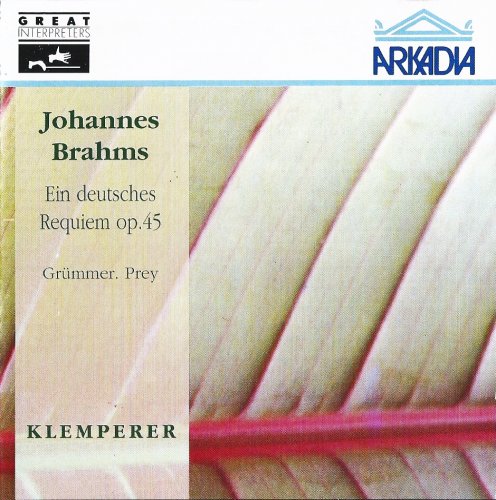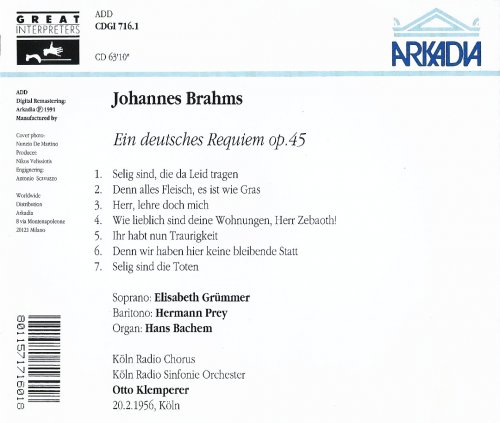Otto Klemperer - Brahms: Ein Deutsches Requiem (1991)

Artist: Otto Klemperer
Title: Brahms: Ein Deutsches Requiem
Year Of Release: 1986
Label: Arkadia
Genre: Classical
Quality: FLAC (image+.cue,log,scans)
Total Time: 01:09:16
Total Size: 263 Mb
WebSite: Album Preview
Tracklist: Title: Brahms: Ein Deutsches Requiem
Year Of Release: 1986
Label: Arkadia
Genre: Classical
Quality: FLAC (image+.cue,log,scans)
Total Time: 01:09:16
Total Size: 263 Mb
WebSite: Album Preview
01. Ein deutsches Requiem (A German Requiem), for soprano, baritone, chorus & orchestra, Op. 45: Selig sind, die da Leid tragen [0:09:29.25]
02. Ein deutsches Requiem (A German Requiem), for soprano, baritone, chorus & orchestra, Op. 45: Denn alles Fleisch, es ist wie Gras [0:12:49.20]
03. Ein deutsches Requiem (A German Requiem), for soprano, baritone, chorus & orchestra, Op. 45: Herr, lehre doch mich [0:08:24.02]
04. Ein deutsches Requiem (A German Requiem), for soprano, baritone, chorus & orchestra, Op. 45: Wie lieblich sind deine Wohnungen, Herr Zebaoth! [0:05:05.28]
05. Ein deutsches Requiem (A German Requiem), for soprano, baritone, chorus & orchestra, Op. 45: Ihr habt nun Traurigkeit [0:06:29.60]
06. Ein deutsches Requiem (A German Requiem), for soprano, baritone, chorus & orchestra, Op. 45: Denn wir haben hier keine bleibende Statt [0:10:09.52]
07. Ein deutsches Requiem (A German Requiem), for soprano, baritone, chorus & orchestra, Op. 45: Selig sind die Toten [0:10:40.38]
Performers:
Elisabeth Grummer - soprano
Hermann Prey - bariton
Hans Bachem
Koln Radio Chorus
Koln Radio Simfonie Orchestra
Otto Klemperer - conductor
This is an indispensable document, capturing Otto Klemperer in an incandescent moment from Feb. 1956 in Cologne. The program notes say that this live reading of the German Requiem "easily surpasses" the conductor's EMI recording from just a few years later – and that is an understatement. It's a wholly different interpretation, full of urgency and spiritual passion of the kind all but unmatched on disc. Furtwangler made two versions in execrable sound that could be said to match this one, and there's Karajan's celebrated account from the ruins of postwar Vienna, best heard in remastering on Naxos Historical. Partisans of Celibidache might point to his live recording from the same era. But Klenperer finds the beating heart of this great testament to Protestant faith, stripping the music of any Victorian gloom and sentimentality.
In keeping with the overall urgency of the interpretation, which often feels like a direct cry to God from the heart of a believer, tempos are quick, sometimes startlingly so, as in the great double fugue that caps the third movement. The chorus is hard pressed there, but for the most part they leap into the spirit of things, singing with real fervency. One gets the sense, no doubt intended by Brahms, of a community of faith speaking with one voice. The only drawback is that the chorus never really gets soft; there is no attempt to evoke hushed mystery, even in the most subdued parts of the fifth movement "Traurigkeit," where Elisabeth Grummer, in best voice, manages to give an impassioned reading that is under vocal control even with Klemperer's urgent pacing. The young Hermann Prey is also at his very best, sounding less rhetorical than Fischer-Dieskau in the studio account and more like a quickened soul awaiting Judgment Day.
The overall timing is 62 min. compared to 69 min. for EMI. The sound, taken from West German Radio sources and remastered by them, is reasonably good mono of the period. Congestion in big climaxes is fairly minimal, and the two vocal soloists are caught close up and forcefully. The major challenge, as with most broadcast tapes from this time, was to keep the treble from being too screechy and fierce. That has been well done here, but it takes a little adjustment to get used to the somewhat reduced high frequencies, which lend a shade of dullness to the recording. I found it quite listenable once I turned the volume up. The filler is a "Serenata nottuna" K. 239 that dates from 1954. These were the years when Klemperer's Mozart readings were gaining acclaim in London and raising him quickly in esteem, so much so that he was given the Philharmonia Orch. out of relative obscurity in Cologne. This is a small but true example of his clear, forthright, spirited way with Mozart, minus the slowing down that would soon set in.
All in all, the new label ICA, established as an offshoot of International Classical Artists, a talent agency, has made a strong impression with one of their initial releases.
In keeping with the overall urgency of the interpretation, which often feels like a direct cry to God from the heart of a believer, tempos are quick, sometimes startlingly so, as in the great double fugue that caps the third movement. The chorus is hard pressed there, but for the most part they leap into the spirit of things, singing with real fervency. One gets the sense, no doubt intended by Brahms, of a community of faith speaking with one voice. The only drawback is that the chorus never really gets soft; there is no attempt to evoke hushed mystery, even in the most subdued parts of the fifth movement "Traurigkeit," where Elisabeth Grummer, in best voice, manages to give an impassioned reading that is under vocal control even with Klemperer's urgent pacing. The young Hermann Prey is also at his very best, sounding less rhetorical than Fischer-Dieskau in the studio account and more like a quickened soul awaiting Judgment Day.
The overall timing is 62 min. compared to 69 min. for EMI. The sound, taken from West German Radio sources and remastered by them, is reasonably good mono of the period. Congestion in big climaxes is fairly minimal, and the two vocal soloists are caught close up and forcefully. The major challenge, as with most broadcast tapes from this time, was to keep the treble from being too screechy and fierce. That has been well done here, but it takes a little adjustment to get used to the somewhat reduced high frequencies, which lend a shade of dullness to the recording. I found it quite listenable once I turned the volume up. The filler is a "Serenata nottuna" K. 239 that dates from 1954. These were the years when Klemperer's Mozart readings were gaining acclaim in London and raising him quickly in esteem, so much so that he was given the Philharmonia Orch. out of relative obscurity in Cologne. This is a small but true example of his clear, forthright, spirited way with Mozart, minus the slowing down that would soon set in.
All in all, the new label ICA, established as an offshoot of International Classical Artists, a talent agency, has made a strong impression with one of their initial releases.


![Manu Delago & Max ZT - Deuce (2026) [Hi-Res] Manu Delago & Max ZT - Deuce (2026) [Hi-Res]](https://img.israbox.com/img/2026-02/19/v5s18xsisjkqnsg5od9qlgck5.jpg)


![Matt Monro - Matt Sings Monro (Live at the BBC, Remastered 2023) [Hi-Res] Matt Monro - Matt Sings Monro (Live at the BBC, Remastered 2023) [Hi-Res]](https://www.dibpic.com/uploads/posts/2026-02/1771586614_k3yj19donljhc_600.jpg)
![Vivian Rosie - Twilight Voodoo (2026 Remaster) [Hi-Res] Vivian Rosie - Twilight Voodoo (2026 Remaster) [Hi-Res]](https://www.dibpic.com/uploads/posts/2026-02/1771389602_cover.jpg)

![Matt Monro - The Nearness Of You (2015) [Hi-Res] Matt Monro - The Nearness Of You (2015) [Hi-Res]](https://www.dibpic.com/uploads/posts/2026-02/1771594612_cover.jpg)
![Kento Tsubosaka - Lines (2026) [Hi-Res] Kento Tsubosaka - Lines (2026) [Hi-Res]](https://www.dibpic.com/uploads/posts/2026-02/1771391986_zw4gprxc9nex6_600.jpg)